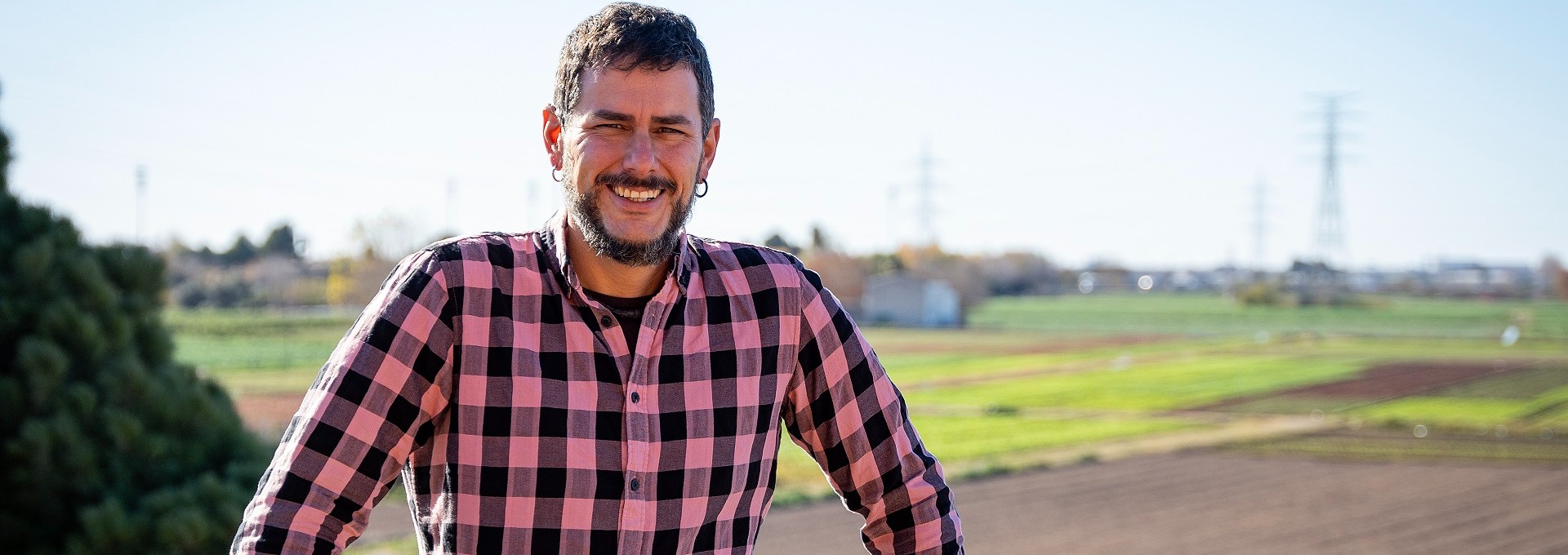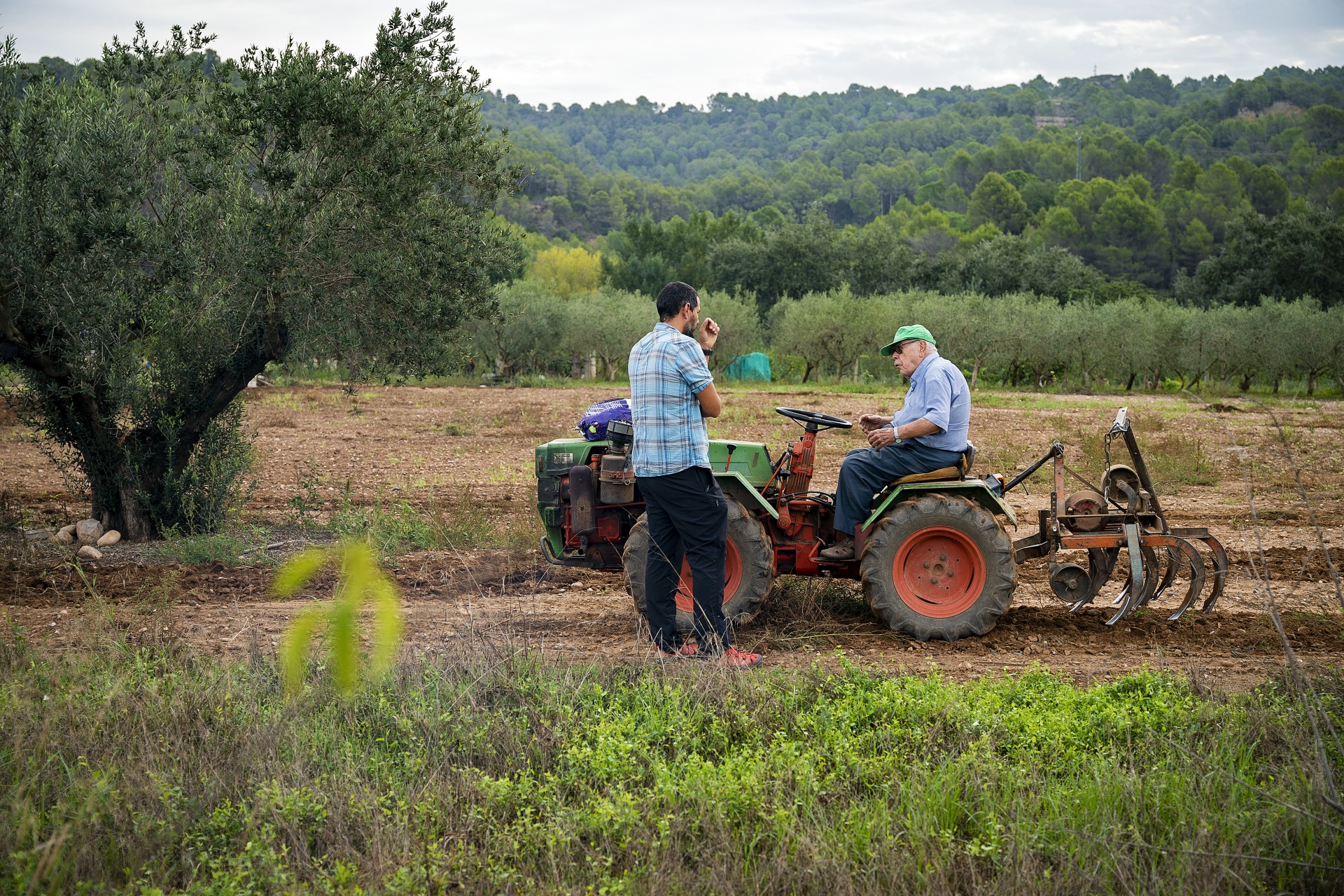Pere Navarro, an engineer from the Agricultural Territorial Directorate of the Barcelona Provincial Council, was born in 1979 in Benimaclet, a neighborhood that retains the essence of a village within the Horta Nord of Valencia. Raised among fields of onions, tiger nuts, lettuces, and cabbages, Pere nostalgically remembers the days when he bought fresh milk directly from the farm next to his house. Asphalt now covers many spaces where fields were once plowed.
His professional career as an expert in land banks began with the creation of the network promoted within the framework of the BCN Smart Rural project, an exciting and complicated challenge that, step by step, is becoming a reference at the Catalan, Spanish, and European levels. With a trajectory marked by continuous learning, Pere combines his skills as a technician with a deep understanding of territorial and human dynamics.
With a degree in Forestry Engineering from the University of Lleida, his passion for the rural world is palpable both in his professional and personal life. Pere especially values the opportunity for his children to explore and enjoy nature, and to learn to link the history of the landscape with their own experience. From his work, what he enjoys the most is establishing connections with those people who aspire to create a greener and more sustainable future.
For him, the incorporation of a young person into the agricultural sector is an act of admirable courage, as he fully understands the complexity and challenges involved in working at the mercy of market whims and climate changes. Thus, Pere Navarro embodies the passion, dedication, and determination that drive the mission of the Land Banks Network of the Barcelona Provincial Council: to open the doors of agriculture to new generations so they can make their projects a reality.
What does being a land bank expert involve and what are your main roles?
A land bank expert is a technician with knowledge in agriculture and territory who is dedicated to facilitating access to land for those who wish to start agricultural projects. In addition, it acts as facilitator and intermediary between the owners of land or agricultural holdings and those looking for available land. The main functions include the management of cartographic data, intermediation between interested parties, the dynamism of the agricultural sector, the management of the possible assistance available, such as the recovery of abandoned land, as well as technical and legal advice for both applicants to farmers as well as to land owners. It is important to emphasize that this professional figure becomes an expert over time, as he faces various situations and contexts that require adaptation and continuous learning. Practical experience in overcoming emerging challenges is key to acquiring specialized knowledge and developing the skills needed to facilitate access to land for new agricultural entrepreneurs.
«An expert in land banks is a technician with knowledge in agriculture and territory who is dedicated to facilitating access to land for those who wish to start agricultural projects» Pere Navarro
What exactly is a landbank and how does Land Banks Network powered by Barcelona Provincial Council work?
A land bank is an external and impartial mediation tool that facilitates communication between those people who wish to offer their land or holdings to anyone who wants to work them. This involves the management of a cartographic database and personal profiles of the interested parties, and contributes to the revitalization of a specific agricultural area. The Land Banks Network goes a step further and is dedicated to connecting various initiatives focused on facilitating access to land. In this sense, it acts as a meeting point for everyone who has or wants land, facilitating the search for available farms to start agricultural projects.
What is the main objective of Land Banks Network and how does it address the current difficulties of access to land and the lack of agricultural relief?
According to the agricultural land abandonment data, in Barcelona's province we have lost around 120,500 hectares of crops since 1956, a fact that should raise concern if we want to guarantee a healthy and local diet. But if we look at this situation from a positive point of view, in province we also have more than 55,000 hectares that could be recovered immediately for food production; to put it in perspective, this extension would be equivalent to that of county from Vallès Occidental! Faced with this scenario, Barcelona Provincial Council promotes Land Banks Network with the aim of protecting and revitalizing abandoned or disused agricultural areas. This action not only aims to guarantee healthy and sustainable food for our population, but also to prevent forest fires, protect the soil, order the territory and promote other eco-social values.
«In Barcelona's province we have lost around 120,500 hectares of crops since 1956» Pere Navarro
In what actions does this revitalization take place?
The revitalization actions of the land banks are diverse and are adapted to each territorial context and its specific needs. Some of these initiatives include the creation of a register of available land and interested applicants; the offer of legal and technical advice for the parties involved, both for the preparation of contracts and for the preparation of business plans; as well as support in projects.
In response to the growing demand for land to cultivate that was generated during the pandemic, when many people looking for a change of life and profession showed interest in Land Banks Network, we created the guide "The Adventure of Being a Farmer", a digital publication designed to provide information and support to young entrepreneurs starting from scratch in the agricultural world. In addition, to facilitate the processes of generational relief in the countryside, we have published "New Farmers", a practical guide aimed at councils and local bodies that want to foster a new generation of agricultural entrepreneurs and livestock farmers in their territories. With the aim of revitalizing the local primary sector, the guide explains various tools to support agricultural entrepreneurship, such as land banks, farmers' nurseries, agricultural test spaces, farmer mentoring, shared workshops and resource banks.
What is the current situation of farmland in Barcelona's districts and what factors have contributed to its decline?
According to the available data, the current agricultural surface in the province of Barcelona represents only 21% of the territory, which represents a considerable reduction if we compare it with the 37% recorded in 1956. This decrease has been caused by several factors, highlighting- ne two: socioeconomic and structural. Socio-economic factors include the aging of people working in the field and the lack of generational relief in the sector. Regarding structural factors, I would highlight the difficulty of accessing land and housing for new farmers, and the fragmentation of plots. In any case, the loss of agricultural fields has such significant consequences as, for example, the progressive and widespread decline of biodiversity, the increase in the intensity and frequency of forest fires, the disappearance of cultural landscapes and the degradation of fertile soils Faced with these challenges, it is essential to take immediate action. It is necessary to promote sustainable agricultural practices, rejuvenate the sector, recover abandoned land, invest in agricultural infrastructure and improve farming incomes.
Where should you act first? Which counties and agricultural parks have the greatest potential for land recovery for crops?
Bages stands out as the Barcelona county with the greatest land recovery potential, followed by Anoia and Alt Penedès, with a total of 40% of the recoverable land potential concentrated between them. In terms of agricultural parks, Montserrat Rural Park is the one with the greatest land recovery potential, with 4,951 hectares, followed by Odena Basin Agrarian Park, with 2,847.
What criteria guide the selection of farms that become part of the Land Bank Network?
Every parcel with agricultural suitability can be part of the land banks promoted by the Barcelona Provincial Council. However, during the inventory process we mark as priority those properties with optimal characteristics, such as good accessibility, sufficient surface for an agricultural operation, availability of agricultural infrastructure and access to water.
«It is necessary to promote sustainable agricultural practices, rejuvenate the sector, recover abandoned land, invest in agricultural infrastructure and improve the income of farmers» Pere Navarro
Which projects are being chosen for the use of these lands and how are they decided? What activities could be developed in these recoverable lands?
At Land Banks Network we prioritize professional agricultural projects and work with the aim of promoting and facilitating access to land for those interested in joining the agricultural sector. As for the types of farms, the variety is great and ranges from vegetable gardens to livestock projects.
How many publicly managed land banks are there currently in province de Barcelona and where are they located?
In the province of Barcelona, at the moment, there are four land banks in operation: in the Lower Llobregat Agrarian Park, the Montserrat Rural Park, the Five Senies-Mata-Valldeix Agrarian Space of Mataró and the Sant Vicenç dels Horts land bank. Also, we are starting to work on the Lower Tordera Agrarian Space and the Odena Basin Agrarian Park landbanks.
What are the advantages of integrating a farm in Land Banks Network powered by Barcelona Provincial Council? What services does the network offer to both land owners and those interested in leasing?
First, we perform an intermediary task between the two interested parties: land owners and those looking for land for agricultural projects. Second, we provide comprehensive advisory services to all parties involved, addressing technical, legal and other needs as the situation dictates. In addition, we offer assistance in the recovery of abandoned land, ensuring that the estates remain in suitable conditions for agricultural exploitation. Soon, we will have an online platform that will facilitate access to the land, allowing interested parties to consult the offers and interact with the technical staff in an efficient and transparent manner.
How will this website work?
The web platform will provide general information about access to land and will offer resources for those who wish to start an agricultural project. In addition, it will have an intranet where land owners, holders of agricultural holdings and land applicants will be able to consult offers and demands for agricultural land and interact with the Land Banks Network technical staff directly and efficiently.
What impact has the service had since its inception, in terms of growth and public interest? What are the current results? How many hectares are currently available? How much land has been recultivated thanks to Land Banks Network?
Since its inception, the service has experienced significant growth, both in quantity and in the extension of available properties. In addition, there has been a substantial increase in the number of applicants and citizens interested in working on idle agricultural and livestock lands. More than a hundred people have applied for one of the available properties, and of these, 74% have submitted official applications. Over the past year, the number of land applicants has grown by more than 29%, and a total of 16.2 hectares have been reclaimed between fields and pastures. Currently, we have an offer of 604 hectares distributed in 295 plots.
«Since its inception, the service has experienced significant growth, both in quantity and in the extension of available properties» Pere Navarro
What success story would you like to share that has been achieved so far with Land Banks Network?
One of the most interesting projects is that of Tatiana Segura and Sergi Ruiz in Esparraguera, who started their journey in land recovery with Can Rasca Orella, an initiative of regenerative agriculture and life. Motivated by their initial success, they decided to venture into asparagus farming and rented another abandoned farm through the mediation of the Montserrat Rural Park land bank.
What are the main barriers facing the implementation of land banks and how are they being addressed?
To begin with, it is crucial to expand the dissemination of this service, especially among landowners, in order to increase the diversity and extent of the offer available: this would allow us to reach a wider audience and attract more people interested in starting an agricultural project. To reactivate more land, broader partnerships need to be established and strategies developed to connect with the new generation of farmers who may need initial guidance. Although we already hold talks and information days from Land Banks Network, we need more support to reach a larger number of people.
What plans do you have to expand or improve the program in the future?
We are currently exploring the possibility of actively collaborating with the agricultural parks, with the aim of seeking synergies and working together to promote the development of the primary sector in these spaces. Our vision is to be able to extend the services of Land Banks Network to all the agricultural parks of province in Barcelona, thus expanding the scope and impact of the program.
How do you promote the participation of young people and new farmers in this model of land management?
We are looking for strategies to approach young people and new farmers through talks and conferences held in schools, institutions and communities that have expressed interest in issues related to access to land and the revitalization of the agricultural sector. In addition, we have organized training sessions in collaboration with entities such as IRTA and Montserrat Rural Park. We have also implemented an itinerant land bank service, traveling town by town to serve all those interested in the program.
What benefits are land banks expected to bring to landowners, farmers and rural communities in general? In other words, what are the advantages of reclaiming agricultural land for the territory and society?
The benefits are diverse, but I consider the most prominent to be the maintenance of an active agricultural sector capable of producing food and reducing the risk of forest fires: these two consequences are crucial in the face of the current climate and food emergency. In fact, when I talk to owners, the first aspect I emphasize is that the economic, natural and landscape value of the land is higher if someone cares for it and cultivates it.
What main advice would you give to people who want to dedicate themselves to the agricultural sector or who are already there and want to improve their project?
Both for those who want to dedicate themselves and for those who are already part of the agricultural sector, the first thing I do is encourage them, because it is a business with a future: despite the complicated situation, food is a vital need for people and that it won't change In addition, from what I have been able to observe and hear, working in the field offers very rewarding moments, especially for those people who enjoy contact with animals or plants.
«Eating is a vital human need and that will not change» Pere Navarro
Could you share a memorable experience or personal learning you've had during your time working on facilitating access to land? What's the most surprising thing you've discovered while doing your job?
Each person is a world and therefore I have had to learn that things cannot always be done in the same way. You can't plan rigidly, because people often surprise you with unexpected turns and you have to change your initial perspective.
In addition to the difficulties in accessing land, have you noticed other significant obstacles that could prevent the development of more agricultural entrepreneurship projects?
One issue I have often observed is the difficulty of accessing housing for those looking for land: finding a place to live is complicated for people who are not originally from the territory. In addition, I believe that as a society we need to consider a deeper debate about the agricultural sector and do everything possible to facilitate the work of the people who provide us with essential, healthy and sustainable food.
— Lola Mayenco —




